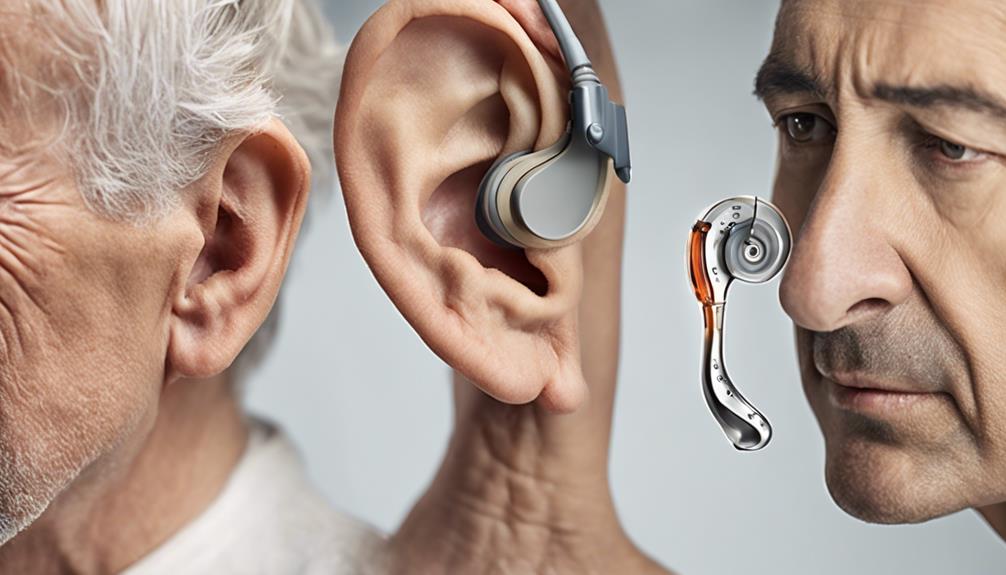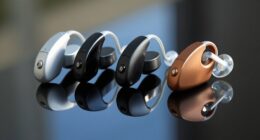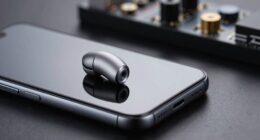A lot of individuals are unaware of the particular criteria required to qualify for cochlear implants, a cutting-edge technological solution. It is essential for healthcare providers and individuals alike to have a clear understanding of these eligibility requirements.
By exploring the nuanced factors that influence candidacy, we can unravel the complexities surrounding who may benefit most from cochlear implants and why.
Key Takeaways
- Adults need severe to profound sensorineural hearing loss for cochlear implant candidacy.
- Poor word recognition and limited benefit from traditional aids are crucial criteria.
- Evaluation includes functional performance, spatial hearing, and standardized assessments.
- Selection considers potential benefits for effective communication in challenging environments.
Overview of Cochlear Implants Criteria
When assessing candidates for cochlear implants, specific criteria related to hearing loss severity and benefit from traditional amplification methods play a crucial role in determining eligibility.
Adults with bilateral severe to profound sensorineural hearing loss are potential candidates for cochlear implants. For candidacy consideration, individuals must demonstrate limited benefit from conventional acoustic amplification. Pure tone average (PTA) thresholds of at least 70 dB HL are required, indicating the severity of hearing impairment.
Additionally, poor monosyllabic word recognition further underscores the need for cochlear implantation. These criteria collectively serve as essential benchmarks in evaluating individuals for cochlear implants.
Understanding the significance of each criterion ensures that those who'd benefit the most from cochlear implants are identified and provided with the opportunity for improved hearing and quality of life.
Key Factors for Candidacy Evaluation

Key considerations in the evaluation of candidacy for cochlear implants encompass a comprehensive analysis of auditory performance metrics and functional outcomes. For pediatric candidates, meeting criteria such as 50% word recognition and audiometric thresholds of at least 70 dB HL is crucial. Additionally, poor functional performance plays a significant role in determining candidacy for children.
In adults, the revised 60/60 rule is emphasized, highlighting the importance of specific word recognition and audiometric thresholds. Spatial hearing assessment and subjective questionnaires are recommended, especially for pediatric cases of single-sided deafness, to ensure a thorough evaluation.
Guidelines also aim to address the variability in assessing adult patients for cochlear implantation, emphasizing the need for a standardized approach. By incorporating these key factors into the candidacy evaluation process, healthcare providers can better serve individuals who may benefit from cochlear implants.
Criteria for Severe Hearing Loss
To determine candidacy for cochlear implants due to severe hearing loss, a comprehensive evaluation of bilateral sensorineural hearing loss in the severe to profound range is typically required, accompanied by a demonstration of limited benefit from traditional hearing aids. When assessing candidacy for cochlear implants in cases of severe hearing loss, several key criteria are considered:
- Audiometric Thresholds: Audiometric thresholds of at least 70 dB HL in the better hearing ear are often a prerequisite for candidacy.
- Word Recognition Scores: Poor word recognition scores may indicate a need for cochlear implants to improve speech understanding.
- Functional Limitations: Significant functional limitations in daily communication can impact candidacy determination.
- Comprehensive Assessment: Evaluation for cochlear implant candidacy involves a thorough assessment of hearing thresholds and speech understanding.
- Communication Abilities: The ability to effectively communicate, especially in challenging listening environments, is crucial in determining the need for cochlear implants.
Understanding Implant Suitability

Moving from the evaluation of severe hearing loss to the assessment of cochlear implant suitability involves a detailed consideration of various factors to determine candidacy for this auditory intervention. Candidates for cochlear implants typically have bilateral severe to profound sensorineural hearing loss and show limited benefit from traditional acoustic amplification methods. They must be at least 18 years old, with a pure tone average (PTA) of at least 70 dB HL and poor monosyllabic word recognition.
For cochlear implant candidacy, individuals should have residual low-frequency hearing along with severe to profound high-frequency sensorineural hearing loss. The evaluation of cochlear implant suitability includes assessing preoperative hearing thresholds, which should range from normal to moderate in low frequencies and severe to profound in mid to high frequencies.
The selection of candidates for cochlear implants is based on the potential benefit the individual may receive from the implant, especially if they haven't experienced significant improvement with conventional hearing aids.
Evaluating Candidacy for Cochlear Implants
Evaluating candidacy for cochlear implants involves a thorough assessment of specific criteria, including bilateral severe to profound sensorineural hearing loss and limited benefit from traditional amplification methods. When considering cochlear implant candidacy, here are the key aspects that are evaluated:
- Age criteria: Individuals aged 18 and older are commonly assessed for cochlear implant candidacy.
- Audiologic parameters: Pure tone average (PTA) of at least 70 dB HL is a crucial factor in the evaluation process.
- Word recognition: Poor monosyllabic word recognition is a significant consideration in determining candidacy for cochlear implants.
- Specialized centers: Comprehensive evaluations at specialized cochlear implant centers are essential for a thorough assessment.
- Assessment process: The evaluation process involves a multidisciplinary team that conducts comprehensive assessments to determine candidacy for cochlear implants.
These factors play a vital role in the assessment and decision-making process for individuals seeking cochlear implants, ensuring that those who could benefit the most from this technology are identified accurately.
Frequently Asked Questions
What Are the 3 Criteria for Qualifying for a Cochlear Implant?
We need to meet three key criteria to qualify for a cochlear implant. These include having severe to profound hearing loss in both ears, limited benefits from traditional hearing aids, and poor monosyllabic word recognition.
These factors play a crucial role in determining candidacy for cochlear implantation. It's essential to fulfill all three criteria to be considered eligible for this transformative hearing solution.
What Factors Determine Candidacy for Cochlear Implants?
Factors determining candidacy for cochlear implants include:
- Bilateral severe to profound sensorineural hearing loss
- Limited benefit from traditional hearing aids
- Age 18 and older
- Pure tone average (PTA) of at least 70 dB HL
- Poor monosyllabic word recognition
- Subjective observations of hearing difficulty
Seeking evaluation is advised for those facing communication challenges despite hearing aid use. These criteria help professionals assess eligibility for cochlear implantation based on individual needs and hearing capabilities.
What Are Current Candidacy Guidelines for Cochlear Implantation?
Sure, we're currently exploring the latest candidacy guidelines for cochlear implantation. These guidelines are critical for ensuring appropriate patient selection and optimal outcomes.
What Makes Someone a Candidate for Cochlear Implant?
We become candidates for cochlear implants based on specific criteria. These include severe to profound hearing loss in both ears, limited benefit from hearing aids, and poor word recognition. Adults aged 18 and older with a PTA of at least 70 dB HL may qualify.
Evaluations also consider overall health, lifestyle, and communication challenges. By meeting these standards, individuals can benefit from cochlear implantation to improve their quality of life.
Conclusion
In conclusion, understanding the candidacy criteria for cochlear implants is essential for identifying individuals who may benefit from this life-changing technology.
By carefully evaluating factors like word recognition and functional performance indicators, healthcare providers can ensure that the right candidates receive the appropriate treatment.
Remember, when it comes to cochlear implants, it's not just about hearing better, it's about opening up a whole new world of sound and communication possibilities.










